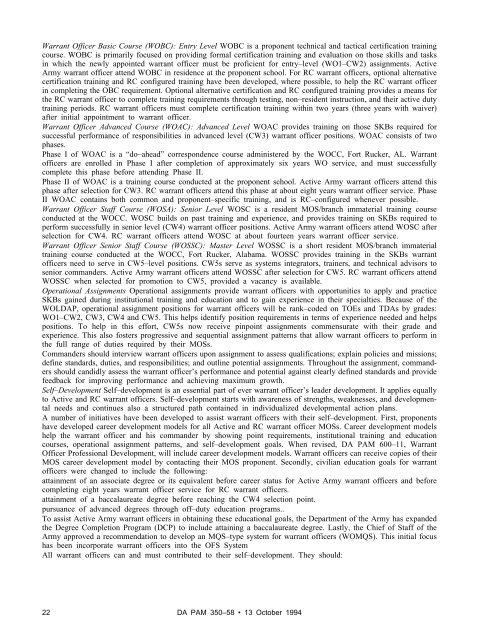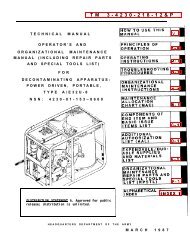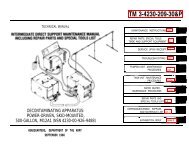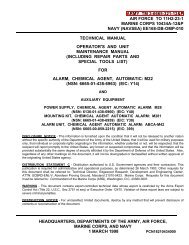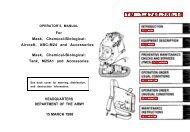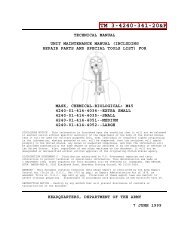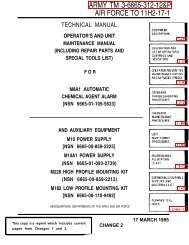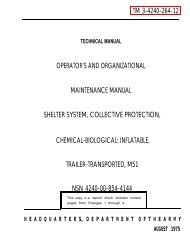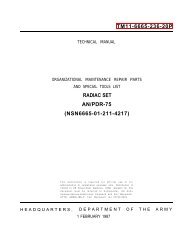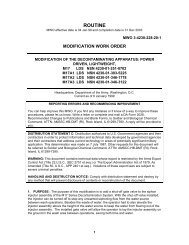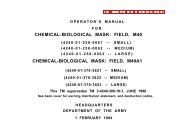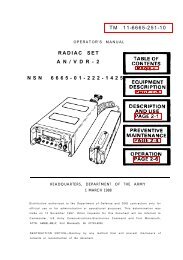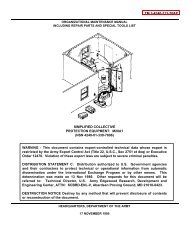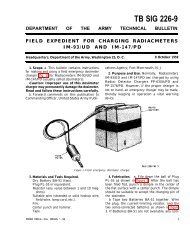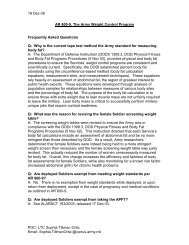LEADER DEVELOPMENT FOR AMERICA'S ARMY
LEADER DEVELOPMENT FOR AMERICA'S ARMY
LEADER DEVELOPMENT FOR AMERICA'S ARMY
You also want an ePaper? Increase the reach of your titles
YUMPU automatically turns print PDFs into web optimized ePapers that Google loves.
Warrant Officer Basic Course (WOBC): Entry Level WOBC is a proponent technical and tactical certification training<br />
course. WOBC is primarily focused on providing formal certification training and evaluation on those skills and tasks<br />
in which the newly appointed warrant officer must be proficient for entry–level (WO1–CW2) assignments. Active<br />
Army warrant officer attend WOBC in residence at the proponent school. For RC warrant officers, optional alternative<br />
certification training and RC configured training have been developed, where possible, to help the RC warrant officer<br />
in completing the OBC requirement. Optional alternative certification and RC configured training provides a means for<br />
the RC warrant officer to complete training requirements through testing, non–resident instruction, and their active duty<br />
training periods. RC warrant officers must complete certification training within two years (three years with waiver)<br />
after initial appointment to warrant officer.<br />
Warrant Officer Advanced Course (WOAC): Advanced Level WOAC provides training on those SKBs required for<br />
successful performance of responsibilities in advanced level (CW3) warrant officer positions. WOAC consists of two<br />
phases.<br />
Phase I of WOAC is a “do–ahead” correspondence course administered by the WOCC, Fort Rucker, AL. Warrant<br />
officers are enrolled in Phase I after completion of approximately six years WO service, and must successfully<br />
complete this phase before attending Phase II.<br />
Phase II of WOAC is a training course conducted at the proponent school. Active Army warrant officers attend this<br />
phase after selection for CW3. RC warrant officers attend this phase at about eight years warrant officer service. Phase<br />
II WOAC contains both common and proponent–specific training, and is RC–configured whenever possible.<br />
Warrant Officer Staff Course (WOSA): Senior Level WOSC is a resident MOS/branch immaterial training course<br />
conducted at the WOCC. WOSC builds on past training and experience, and provides training on SKBs required to<br />
perform successfully in senior level (CW4) warrant officer positions. Active Army warrant officers attend WOSC after<br />
selection for CW4. RC warrant officers attend WOSC at about fourteen years warrant officer service.<br />
Warrant Officer Senior Staff Course (WOSSC): Master Level WOSSC is a short resident MOS/branch immaterial<br />
training course conducted at the WOCC, Fort Rucker, Alabama. WOSSC provides training in the SKBs warrant<br />
officers need to serve in CW5–level positions. CW5s serve as systems integrators, trainers, and technical advisors to<br />
senior commanders. Active Army warrant officers attend WOSSC after selection for CW5. RC warrant officers attend<br />
WOSSC when selected for promotion to CW5, provided a vacancy is available.<br />
Operational Assignments Operational assignments provide warrant officers with opportunities to apply and practice<br />
SKBs gained during institutional training and education and to gain experience in their specialties. Because of the<br />
WOLDAP, operational assignment positions for warrant officers will be rank–coded on TOEs and TDAs by grades:<br />
WO1–CW2, CW3, CW4 and CW5. This helps identify position requirements in terms of experience needed and helps<br />
positions. To help in this effort, CW5s now receive pinpoint assignments commensurate with their grade and<br />
experience. This also fosters progressive and sequential assignment patterns that allow warrant officers to perform in<br />
the full range of duties required by their MOSs.<br />
Commanders should interview warrant officers upon assignment to assess qualifications; explain policies and missions;<br />
define standards, duties, and responsibilities; and outline potential assignments. Throughout the assignment, commanders<br />
should candidly assess the warrant officer’s performance and potential against clearly defined standards and provide<br />
feedback for improving performance and achieving maximum growth.<br />
Self–Development Self–development is an essential part of ever warrant officer’s leader development. It applies equally<br />
to Active and RC warrant officers. Self–development starts with awareness of strengths, weaknesses, and developmental<br />
needs and continues also a structured path contained in individualized developmental action plans.<br />
A number of initiatives have been developed to assist warrant officers with their self–development. First, proponents<br />
have developed career development models for all Active and RC warrant officer MOSs. Career development models<br />
help the warrant officer and his commander by showing point requirements, institutional training and education<br />
courses, operational assignment patterns, and self–development goals. When revised, DA PAM 600–11, Warrant<br />
Officer Professional Development, will include career development models. Warrant officers can receive copies of their<br />
MOS career development model by contacting their MOS proponent. Secondly, civilian education goals for warrant<br />
officers were changed to include the following:<br />
attainment of an associate degree or its equivalent before career status for Active Army warrant officers and before<br />
completing eight years warrant officer service for RC warrant officers.<br />
attainment of a baccalaureate degree before reaching the CW4 selection point.<br />
pursuance of advanced degrees through off–duty education programs..<br />
To assist Active Army warrant officers in obtaining these educational goals, the Department of the Army has expanded<br />
the Degree Completion Program (DCP) to include attaining a baccalaureate degree. Lastly, the Chief of Staff of the<br />
Army approved a recommendation to develop an MQS–type system for warrant officers (WOMQS). This initial focus<br />
has been incorporate warrant officers into the OFS System<br />
All warrant officers can and must contributed to their self–development. They should:<br />
22 DA PAM 350–58 • 13 October 1994


